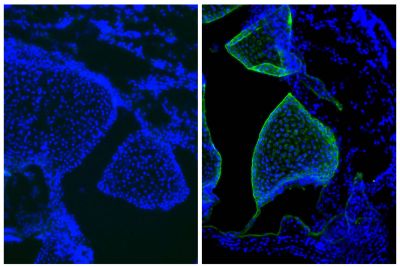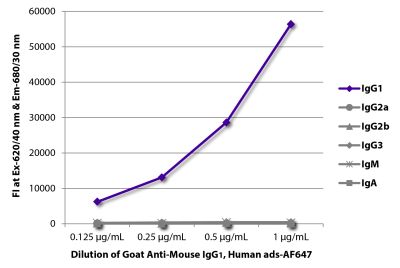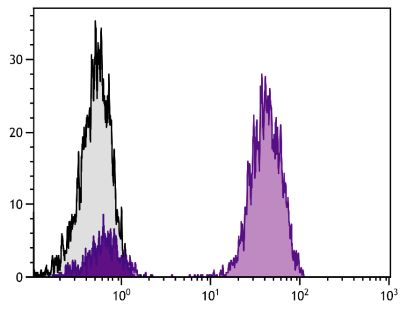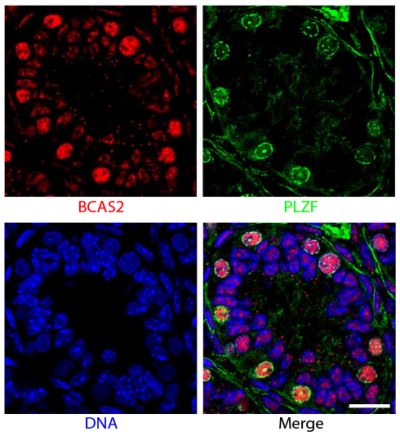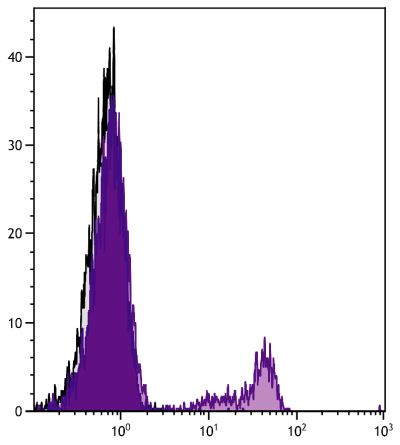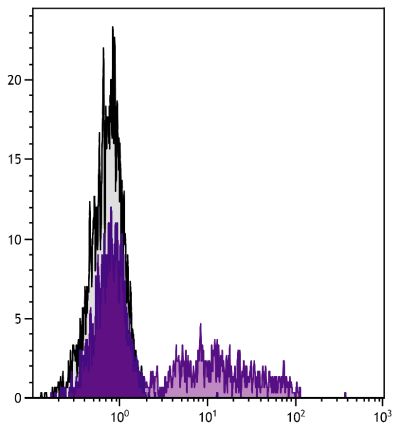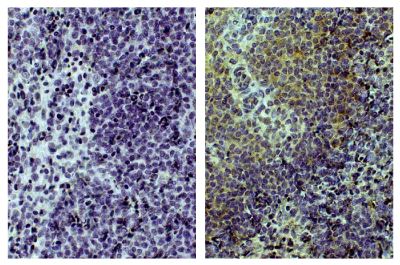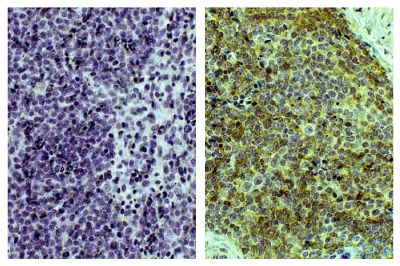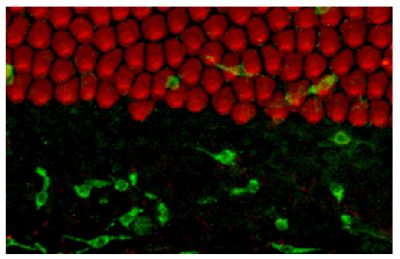Mouse Anti-Chicken TCRαβ/Vβ1-UNLB (TCR-2)
Cat. No.:
8240-01
Purified Anti-Chicken TCRαβ/Vβ1 antibody for use in flow cytometry, immunohistochemistry, immunoprecipitation, depletion, and stimulation assays.
$278.00
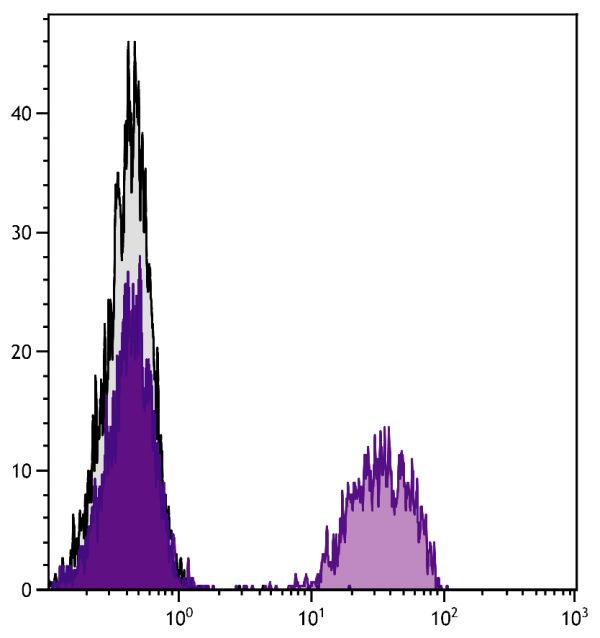

| Clone | TCR-2 |
|---|---|
| Isotype | Mouse (BALB/c) IgG1κ |
| Isotype Control | Mouse IgG1-UNLB (15H6) |
| Specificity | Chicken/Turkey/Peacock/Guinea Fowl TCRαβ/Vβ1 |
| Alternative Names | T3/TCR complex, TCR alpha/beta |
| Description | The monoclonal antibody TCR-2 precipitates a CD3-associated heterodimer of Mr 90 kDa (two bands of Mr 50 kDa and 40 kDa upon reduction) on chicken peripheral blood T cells. Deglycosylation of the heterodimer yields two polypeptides of Mr 34 kDa and 29 kDa. In the chicken, two distinct subpopulations of αβ T cells appear in the thymus subsequent to the appearance of γδ T cells. These subpopulations, originally denoted as TCR2 and TCR3, arise sequentially in the thymus during ontogeny and are now known to represent two distinct Vβ families, Vβ1 and Vβ2, respectively. The TCR-2 monoclonal antibody reacts with approximately 40% of thymocytes, 40-50% of blood mononuclear cells, and 40% of splenocytes in the chicken. Two-color immunofluorescence has revealed that most of the TCR2+ thymocytes express both CD4 and CD8 antigens. The TCR2+ cells in blood were found to express either CD4 (74 ± 2%) or CD8 (26 ± 4%). TCR2+ cells in the spleen also express either CD4 (37 ± 1%) or CD8 (64 ± 4%). Surprisingly, a relatively large subpopulation of CD8+ cells in the spleen are negative for TCR2. This observation led to the demonstration that 71 ± 6% of the TCRγδ+ cells in the spleen express CD8. |
| Immunogen | White Leghorn chick thymocytes and blood mononuclear cells |
| Conjugate | UNLB (Unconjugated) |
| Buffer Formulation | Borate buffered saline, pH 8.2 |
| Clonality | Monoclonal |
| Concentration | 0.5 mg/mL |
| Volume | 1.0 mL |
| Recommended Storage | 2-8°C |
| Applications |
Flow Cytometry – Quality tested 2,9-12 Immunohistochemistry-Frozen Sections – Reported in literature 3-5,12 Immunohistochemistry-Paraffin Sections – Reported in literature 6 Immunoprecipitation – Reported in literature 2,12 Depletion – Reported in literature 7 Stimulation – Reported in literature 8 |
| RRID Number | AB_2796454 |
Documentation
Certificate of Analysis Lookup
Enter the Catalog Number and Lot Number for the Certificate of Analysis you wish to view
- 1. Cihak J, Ziegler-Heitbrock HW, Trainer H, Schranner I, Merkenschlager M, Lösch U. Characterization and functional properties of a novel monoclonal antibody which identifies a T cell receptor in chickens. Eur J Immunol. 1988;18:533-7. (Immunogen)
- 2. Chen CH, Cihak J, Lösch U, Cooper MD. Differential expression of two T cell receptors, TcR1 and TcR2, on chicken lymphocytes. Eur J Immunol. 1988;18:539-43. (FC, IP)
- 3. Tanimura N, Sharma JM. Appearance of T cells in the bursa of Fabricius and cecal tonsils during the acute phase of infectious bursal disease virus infection in chickens. Avian Dis. 1997;41:638-45. (IHC-FS)
- 4. Gaunson JE, Philip CJ, Whithear KG, Browning GF. Lymphocytic infiltration in the chicken trachea in response to Mycoplasma gallisepticum infection. Microbiology. 2000;146:1223-9. (IHC-FS)
- 5. Bader SR, Kothlow S, Trapp S, Schwarz SC, Philipp H, Weigend S, et al. Acute paretic syndrome in juvenile White Leghorn chickens resembles late stages of acute inflammatory demyelinating polyneuropathies in humans. J Neuroinflammation. 2010;7:7. (IHC-FS, FC)
- 6. Solcan C, Solcan G, Cotea C. Immunotoxic action of ochratoxine A on lymphocytes from lymphoid tissues associated to gut mucosa in chickens. Bulletin UASVM Agriculture. 2010;67:283-90. (IHC-PS)
- 7. Cihak J, Lösch U, Hoffmann-Fezer G, Chen CH, Cooper MD, Ziegler-Heitbrock HW. In vivo depletion of chicken T-cell subsets. Scand J Immunol. 1993;38:123-9. (Depletion)
- 8. Göbel TW, Schneider K, Schaerer B, Mejri I, Puehler F, Weigend S, et al. IL-18 stimulates the proliferation and IFN-γ release of CD4+ T cells in the chicken: conservation of a Th1-like system in a nonmammalian species. J Immunol. 2003;171:1809-15. (Stim)
- 9. Koskinen R, Göbel TW, Tregaskes CA, Young JR, Vainio O. The structure of avian CD5 implies a conserved function. J Immunol. 1998;160:4943-50. (FC)
- 10. Machado PC Jr, Beirão BC, Filho TF, Lourenço MC, Joineau ML, Santin E, et al. Use of blends of organic acids and oregano extracts in feed and water of broiler chickens to control Salmonella Enteritidis persistence in the crop and ceca of experimentally infected birds. J Appl Poult Res. 2014;23:671-82. (FC)
- 11. Schusser B, Collarini EJ, Yi H, Izquierdo SM, Fesler J, Pedersen D, et al. Immunoglobulin knockout chickens via efficient homologous recombination in primordial germ cells. Proc Natl Acad Sci USA. 2013;110:20170-5. (FC)
- 12. Char D, Sanchez P, Chen CH, Bucy RP, Cooper MD. A third sublineage of avian T cells can be identified with a T cell receptor-3-specific antibody. J Immunol. 1990;145:3547-55. (IP, FC, IHC-FS, Turkey, Peacock, and Guinea Fowl Reactivity)
See All References


